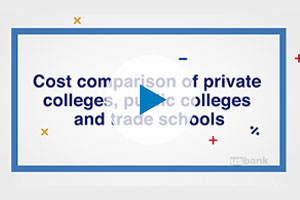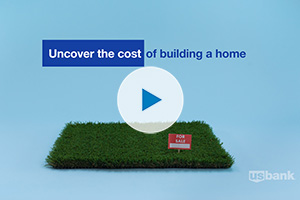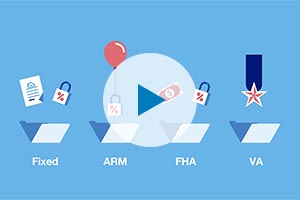
Which is better: Combining bank accounts before marriage — or after?

Is it time to get a shared bank account with your partner?

5 reasons why couples may have separate bank accounts

Don’t underestimate the importance of balancing your checking account

30-day adulting challenge: Financial wellness tasks to complete in a month

Estate planning checklist: 8 steps to secure your legacy

How do interest rates work?

Investment strategies by age

8 steps to choosing a health insurance plan

Key milestone ages as you near and start retirement

How to build a financial plan that covers your savings and expenses

How I did it: Bought a home without a 20 percent down payment

How to save money while helping the environment

5 ways to maximize your garage sale profits

Asset classes explained: Cash, bonds, real estate and equities

How to manage your money: 7 tips to improve your finances

What is a home equity line of credit (HELOC) and what can it be used for?

Preparing for retirement: 8 steps to take

Multiple accounts can make it easier to follow a monthly budget

Estate planning documents: Living trusts vs. will vs. living will

Why estate planning is important

Understanding yield vs. return

What type of investor are you?

How a Health Savings Account (HSA) can benefit your retirement plan

Year-end financial checklist

Rule 18f-4: The limited use exception

Housing market trends and relocation impact

Interval funds find growing popularity

Finance or operating lease? Deciphering the legalese of equipment finance

Buying or leasing? Questions to ask before signing a contract

ESG-focused investing: A closer look at the disclosure regulation

3 questions to ask your equity, quant and CTA fund administrator

Insource or outsource? 10 considerations

The secret to successful service provider integration

Safeguarding the payment experience through contactless

COVID-19 safety recommendations: Are you ready to reopen?

Unexpected cost savings may be hiding in your payment strategy

OCIO: An expanding trend in the investment industry

Changes in credit reporting and what it means for homebuyers

How institutional investors can meet demand for ESG investing

High-cost housing and down payment options in relocation

Crypto + Relo: Mobility industry impacts

For today's relocating home buyers, time and money are everything

How to sell your business without emotions getting in the way

5 steps to take before transitioning your business

10 tips on how to run a successful family business

Talent acquisition 101: Building a small business dream team

Make your business legit

How I did it: Turned my side hustle into a full-time job

Costs to consider when starting a business

How to test new business ideas

How to get started creating your business plan

How to establish your business credit score

The costs of hiring a new employee

How to expand your business: Does a new location make sense?

How to build a content team

Multigenerational household financial planning strategies

LGBTQ+ financial planning tips

Do I need a financial advisor?

5 financial goals for the new year

How to track expenses

How to manage your finances when you're self-employed

Good debt vs. bad debt: Know the difference

Good money habits: 6 common money mistakes to avoid

Reviewing your beneficiaries: A 5-step guide

How to talk about money with your family

Financial steps to take after the death of a spouse

6 tips for trust fund distribution to beneficiaries

How to build wealth at any age

Retirement plan options for the self-employed

Retirement advice: How to retire happy

Retirement income planning: 4 steps to take

Retirement savings by age

Preparing for retirement: 8 steps to take

What is Medicare? Understanding your coverage options

7 things to know about long-term care insurance

Working after retirement: Factors to consider

4 steps to finding a charity to support

Year end tax planning tips

Should I itemize my taxes?

A guide to tax diversification in investing

Economic forecast: 3 things to know for 2024's 2nd half

Bull vs. bear market: What do they mean for you?

Start a Roth IRA for kids

Investing myths: Separating fact from fiction in investing

What Is a 401(k)?

What are alternative investments?

4 times to consider rebalancing your portfolio

Effects of inflation on investments

How much money do I need to start investing?

7 diversification strategies for your investment portfolio

Saving vs. investing: What's the difference?

Why compound annual growth matters

How to start investing: A beginner’s guide

5 questions to help you determine your investment risk tolerance

What types of agency accounts are available for investors?

Tips for navigating a medical hardship when you’re unable to work

11 essential things to do before baby comes

How to plan and save for adoption and in vitro fertility treatment costs

Checklist: 10 questions to ask your home inspector

Closing on a house checklist for buyers

Resources for managing financial matters after an unexpected death

What you need to know as the executor of an estate

What documents do you need after a loved one dies?

Checklist: financial recovery after a natural disaster

How I did it: Paid off student loans

Bank Notes: College cost comparison

Annual insurance review checklist

From LLC to S-corp: Choosing a small business entity

Recognize. React. Report. Caregivers can help protect against financial exploitation

Is online banking safe?

Pros and cons of a personal line credit

3 tips for saving money when moving to a new home

Is raising backyard chickens a good idea financially?

Friction: How it can help achieve money goals

Your 5-step guide to financial planning

Uncover the cost: Wedding

Uncover the cost: International trip

Tips to overcome three common savings hurdles

Adulting 101: How to make a budget plan

Personal loans first-timer's guide: 7 questions to ask

3 awkward situations Zelle can help avoid

How can I help my student manage money?

You can take these 18 budgeting tips straight to the bank

Save time and money with automatic bill pay

Do you and your fiancé have compatible financial goals?

U.S. Bank asks: Transitioning out of college life? What’s next?

U.S. Bank asks: Do you know your finances?

Personal finance for teens can empower your child

It's possible: 7 tips for breaking the spending cycle

How to save for a wedding

Here’s how to create a budget for yourself

9 simple ways to save

Dear Money Mentor: How do I set and track financial goals?

Lost job finance tips: What to do when you lose your job

Money Moments: 3 smart financial strategies when caring for aging parents

Money management guide to financial independence

Money Moments: 8 dos and don’ts for saving money in your 30s

7 financial questions to consider when changing jobs

Travel for less: Smart (not cheap) ways to spend less on your next trip

What’s in your emergency fund?

What you need to know about renting

How to stop living paycheck to paycheck post-pay increase

Understanding guardianship and power of attorney in banking

What financial advice would you give your younger self?

How grandparents can contribute to college funds instead of buying gifts

How to open and invest in a 529 plan

Using 529 plans for K-12 tuition

Parent checklist: Preparing for college

What to consider before taking out a student loan

How to use debt to build wealth

7 steps to keep your personal and business finances separate

Know your debt-to-income ratio

Overcoming high interest rates: Getting your homeownership goals back on track

For today's homebuyers, time and money are everything

Crypto + Homebuying: Impacts on the real estate market

Should you buy a house that’s still under construction?

How I did it: Bought my dream home using equity

Buying a home Q&A: What made three homeowners fall in love with their new home

House Hacks: How buying an investment property worked as my first home

Managing the impacts of appraisal gaps in a hot housing market

How I did it: Built living spaces to support my family

Spring cleaning checklist for your home: 5 budget-boosting tasks

Saving for a down payment: Where should I keep my money?

Your guide to breaking the rental cycle

Checklist: 6 to-dos for after a move

What are conforming loan limits and why are they increasing

Military homeownership: Your guide to resources, financing and more

Uncover the cost: Building a home

The lowdown on 6 myths about buying a home

Home buying myths: Realities of owning a home

4 ways to free up your budget (and your life) with a smaller home

Get more home for your money with these tips

Money Moments: Tips for selling your home

Money Moments: How to finance a home addition

How I did it: My house remodel

Dear Money Mentor: When should I refinance a mortgage?

Beyond the mortgage: Other costs for homeowners

Building a dream home that fits your life

10 ways to increase your home’s curb appeal

10 questions to ask when hiring a contractor

5 things to avoid that can devalue your home

How you can take advantage of low mortgage rates

What is an escrow account? Do I have one?

Is it the right time to refinance your mortgage?

What to know when buying a home with your significant other

These small home improvement projects offer big returns on investment

Should you get a home equity loan or a home equity line of credit?

Mortgage basics: How much house can you afford?

Mortgage basics: Finding the right home loan for you

Is a home equity line of credit (HELOC) right for you?

How to use your home equity to finance home improvements

How do I prequalify for a mortgage?

Home equity: Small ways to improve the value of your home

Can you take advantage of the dead equity in your home?

8 steps to take before you buy a home

6 questions to ask before buying a new home

10 uses for a home equity loan

Car shopping: Buying versus leasing your next vehicle

Take the stress out of buying your teen a car

How to winterize your vehicle

Questions to ask before buying a car

